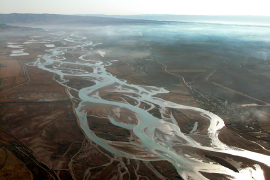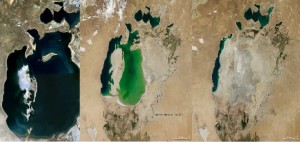
Water Security in Central Asia: The Aral Sea
Part I: Concerns regarding the Aral Sea and the role of water security
Water security and hydro-infrastructure in Central Asia play a fundamental role in regional stability. A recent report by the International Crisis Group detailed water challenges in Central Asia, highlighting the Rogun Dam, a hydropower plant under construction in Tajikistan planned to be the world’s tallest when complete, as a potential threat to regional water security. Tense rhetoric around the dam’s development is heightening international discord in the region. Uzbekistan, in light of its already depleted Aral Sea Basin, has been a strong opponent to Tajikistan’s Rogun Dam construction. The proposed hydropower plant would be a geopolitical power-play for Tajikistan, leaving downstream Uzbekistan and the Aral Sea at their mercy for a reliable water supply.
 The Aral Sea basin has drastically reduced in size over the last forty years. Water depletion is blamed on substandard agrarian habits and deficient irrigation techniques in Central Asia, a result of lingering Soviet agricultural practices. Unsustainable irrigation methods have disallowed mountain water runoff to adequately refill the basin. Historically, the Amu Darya and Syr Darya rivers steadily flowed into the Aral Sea, allowing consistent water access in downstream Uzbekistan. At its current rate, climate change will increase temperatures in the Tian Shan and Pamir mountain ranges, creating further glacial runoff; however, it is only a matter of time until the water source is exhausted. In light of climate change factors, Rogun Dam is expected to safeguard water in region by managing the Amu Darya’s flow to downstream countries; however, regional geopolitics may threaten resource distribution. The Rogun Dam’s construction will likely advance Tajik influence in the region, a political shift in an already strained region stricken by dissonance and a shifting climate.
The Aral Sea basin has drastically reduced in size over the last forty years. Water depletion is blamed on substandard agrarian habits and deficient irrigation techniques in Central Asia, a result of lingering Soviet agricultural practices. Unsustainable irrigation methods have disallowed mountain water runoff to adequately refill the basin. Historically, the Amu Darya and Syr Darya rivers steadily flowed into the Aral Sea, allowing consistent water access in downstream Uzbekistan. At its current rate, climate change will increase temperatures in the Tian Shan and Pamir mountain ranges, creating further glacial runoff; however, it is only a matter of time until the water source is exhausted. In light of climate change factors, Rogun Dam is expected to safeguard water in region by managing the Amu Darya’s flow to downstream countries; however, regional geopolitics may threaten resource distribution. The Rogun Dam’s construction will likely advance Tajik influence in the region, a political shift in an already strained region stricken by dissonance and a shifting climate.
 ASP recently released a report outlining five critical issues that Central Asia currently faces, including climate change and its relation to water security. The report concluded that “Water scarcity has become a source of friction between Central Asia states, particularly between upstream and downstream nations. Dams in the upstream countries of Tajikistan and Kyrgyzstan make the downstream countries of Uzbekistan and Turkmenistan concerned because of the potential lack of water supply during the summer.” To address these abiding regional concerns, Uzbekistan announced it will hold a water conference in late October. The conference will feature discourse about the conflict over the Aral Sea Basin by analyzing environmental concerns, bringing international awareness to the resource dispute, and finding solutions to settle water scarcity-based contentions in Central Asia.
ASP recently released a report outlining five critical issues that Central Asia currently faces, including climate change and its relation to water security. The report concluded that “Water scarcity has become a source of friction between Central Asia states, particularly between upstream and downstream nations. Dams in the upstream countries of Tajikistan and Kyrgyzstan make the downstream countries of Uzbekistan and Turkmenistan concerned because of the potential lack of water supply during the summer.” To address these abiding regional concerns, Uzbekistan announced it will hold a water conference in late October. The conference will feature discourse about the conflict over the Aral Sea Basin by analyzing environmental concerns, bringing international awareness to the resource dispute, and finding solutions to settle water scarcity-based contentions in Central Asia.







[…] hydropower plant began in 1976; thirty-eight years later, the Rogun Dam is still unfinished. Part I of this series outlined the geopolitical ramifications of the dam’s construction centered on […]
[…] my piece on concerns regarding the Aral Sea and the role of water security in Central […]
[…] hydropower plant began in 1976; thirty-eight years later, the Rogun Dam is still unfinished. Part I of this series outlined the geopolitical ramifications of the dam’s construction centered on […]
[…] Water Security in Central Asia: The Aral Sea […]